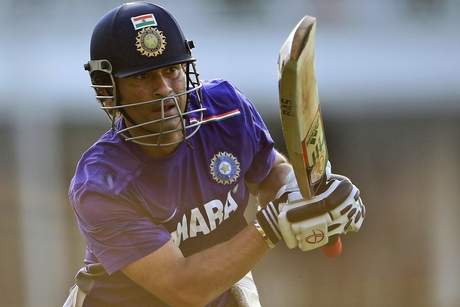I have been impressed, since arriving in the UAE — which is only a few air hours from the subcontinent — at what we Americans do not know about India.
And vice versa.
Take, for instance, Sachin Tendulkar.
It will be the rare American, stateside, who has any idea who Sachin Tendulkar is. What sport he plays. Or what the news of him is, this week.
Big, massive, all-encompassing, paralysis-inducing news, in India.
An observation. In some four decades of fairly steady traveling, I have come to the conclusion that three nations on the planet are big enough and self-focused enough to lead to a state of mind that allows little room for “foreign” news or notions.
That would be China, India and the United States.
Each of those countries has such a mountain of cultural and historical singularity (or is convinced it does) that the masses are unlikely to spend much time looking outside their borders. Why should they? Their home countries are sufficient unto themselves. (And China may be the most convinced of this.)
Americans often are mocked, by outsiders, for a lack of knowledge of the wider world. And, as the world’s only superpower, it would be nice if more Yanks knew Slovenia from Slovakia, Iraq from Iran.
However, I would maintain that the situations in India and China, also great in size and population and particularism, are much the same to that found in the U.S. A high degree of self-interest. A sense of pointlessness in paying attention to the issues affecting others.
India and China share a border, a tense border, so they know a bit about each other. Proximity, even if their population centers are far, far away from that border.
And the U.S. knows a bit about China, having been interested in (sometimes preoccupied by) it in the 19th and 20th centuries. Also, more than a few Chinese made their way to the U.S. in the 19th century, no small fraction of them involved with the building of railroads. It is hard to find a town in the U.S. that does not have a Chinese restaurant.
But the U.S. and India? Almost no contact. Almost no human exchanges between them, until quite recently.
And why should there have been? On other sides of the world. Differences in language and religion. Big, insular, inward-looking countries, already rich with cultural diversity inside their borders. India even has Bollywood, making that country perhaps the only other in the world that does not need Hollywood.
One has baseball. One has cricket. And no need for the other.
India was Britain’s patch, for about two centuries, and steady contacts since leave them far more aware of each other. A British schoolboy might have better luck finding Bombay (Mumbai) on a map than Los Angeles.
Meantime, what mattered to India? Certainly not the distant United States. Almost no trade, nothing in common, very few expatriates living in either country. No wars, no rumors of wars. Just very … distant.
(Another thought: Recall “world history” classes in U.S. schools. An inevitable chapter — usually just the one — in the textbook would deal with Asia, but it would be tilted heavily towards China and Japan. India would get scant mention.)
If India pays attention to other countries, they would rank something like this: neighbors Pakistan, Sri Lanka, Bangladesh and Nepal, and then maybe Russia and China and then perhaps those places where Indian emigres have lived for quite some time — Southeast Asia, the Gulf, Hong Kong. Africa, even.
Meantime, the U.S. has long been oriented towards England (having practically adopted English history, pre-1776, that is), and then Western Europe in general, the source of nearly all immigrants well into the 20th century. And then Canada and Mexico and Central America, all nearby. Germany and Russia, during times of war (hot or cold), and Japan and China, potential rivals in the Pacific, would come up … but not India.
Which takes us back to Sachin Tendulkar.
He is arguably the greatest cricket batsman to walk the earth. And he is playing his final competition over the next five days, a test match against the West Indies, in Mumbai.
This is enormous news in this part of the world. (Arabs rarely play cricket, but they certainly know many nearby peoples do.)
We have been writing about this, in The National, for weeks, since Tendulkar announced this would be his last competition.
The National’s leading cricket authority, Osman Samiuddin, yesterday wrote about how fun it would be if Tendulkar scored one last hundred (100 runs) in his last competition.
And for the Thursday newspaper, we had another 1,000 words, from a correspondent, suggesting Tendulkar is special also because of his ability to focus on the game in a nation consumed by cricket.
So, 1.2 billion Indians, pretty much all of them wondering how Tendulkar will do in the coming days, checking up on and India’s team every few minutes … and on the other side of the world, the planet’s mightiest nation, a place where not one person in 50 knows who Tendulkar is. (Just as hardly any more Indians would know Babe Ruth.)
It reinforces, again, how little the two of the world’s greatest countries know about each other.
We keep hearing about how the world is shrinking, but it is not yet so small that Americans will have any interest, at all, in the final days of Sachin Tendulkar.


1 response so far ↓
1 Doug // Nov 15, 2013 at 4:35 PM
The San Jose Mercury News ran a story about Tendulkar with a local angle.
http://www.mercurynews.com/sports/ci_24532652/god-cricket-retires-indians-from-mumbai-bay-area
Leave a Comment